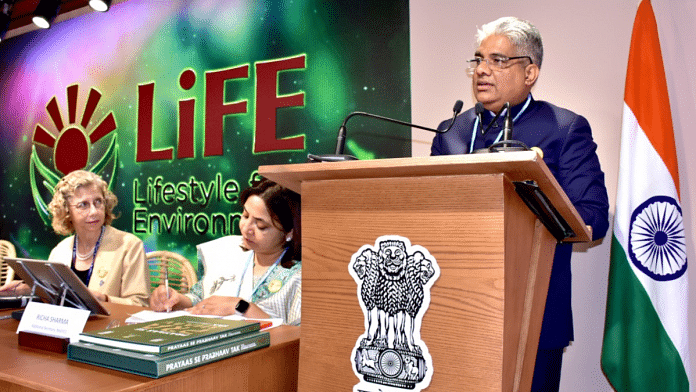Sharm el-Sheikh, Egypt: At a high-level ministerial event during the ongoing COP27, Environment Minister Bhupender Yadav made a veiled dig at the US’s recent proposal to tackle emission reduction through carbon offsets – a controversial programme that experts have said is unlikely to translate to meaningful climate action.
Yadav was speaking at a roundtable to discuss the “pre-2030” ambition – climate pledges made after the Paris Agreement came into effect in 2016. During the intervention, Yadav said increasing climate ambition requires “public action”.
“Leaving it to markets alone will not help. Markets do not function well in normal times… but either do not function or function very inequitably in moments of crisis. We see this with the energy crisis in developed countries. For developing countries, public action includes public sources of climate finance and technology. These are essential,” he told a group of ministers from across the world.
On 9 November, US special climate envoy John Kerry launched a carbon offset plan intended to move developing countries away from fossil fuels. The scheme plans to have large corporations fund renewable energy projects in developing countries to generate carbon credits.
Experts have pointed out that carbon market mechanisms have had a poor track record in reducing emissions at the scale required to limit global warming.
The US is also among the countries to have contributed least to climate finance, an analysis by think tank Overseas Development Foundation found. Of $100 billion in climate finance promised to developing nations, the US should have contributed $43.48 billion, but delivered only 5 per cent of this in 2020.
“Calling for ambition from developing countries is not meaningful if the time required from low-carbon development is not recognised. Unfortunately, with every decade, with every new agreement, with every new scientific report, more and more action is demanded from developing countries. If goalposts are changed constantly, it will not yield results but only words and promises,” Yadav said.
‘Growth will be restricted in developing countries’
Developed and developing countries have locked horns over the burden of increasing climate ambition to drive down emissions, which cost money and require technological support.
The Paris Agreement states countries must attempt to limit global warming to “well below” 2 degrees, and preferably to 1.5 degrees, above pre-industrial levels. Every degree of warming can exacerbate the effects of climate change, scientists have said.
With the world already at 1.1 degrees, developed countries have pushed to increase climate ambitions in order to stick to 1.5 degrees of warming. But developing countries, including India, have said this is a selective reading of the Paris Agreement which puts an unfair burden on developing countries to decarbonise faster, without adequate safeguards.
“Why is there any need to start talking of the adequacy of the provisions of the Paris Agreement?” Yadav said at the ministerial event, adding, “There is also the question of whether technology is available and ready and whether it can be deployed at reasonable cost. If this cannot be done, but ambition is forced, then the growth will be restricted in developing countries.”
Yadav said a transition away from fossil fuels must not target just one sector, and that a just transition “means increased support for the deployment of renewables, increased support for the development of renewable technologies and means to cope with the costs of such development and the deployment of such technologies”.
Yadav also brought up the developed countries’ failure to meet climate targets before the Paris Agreement, called “pre-2020 ambitions”. This refers to the global agreement called the Kyoto Protocol, in which industrialised countries had agreed to reduce greenhouse gas emissions. The US, famously, never signed the agreement.
Also read: At COP27, India unveils long-term strategy to reach net zero, prioritises energy & food security



